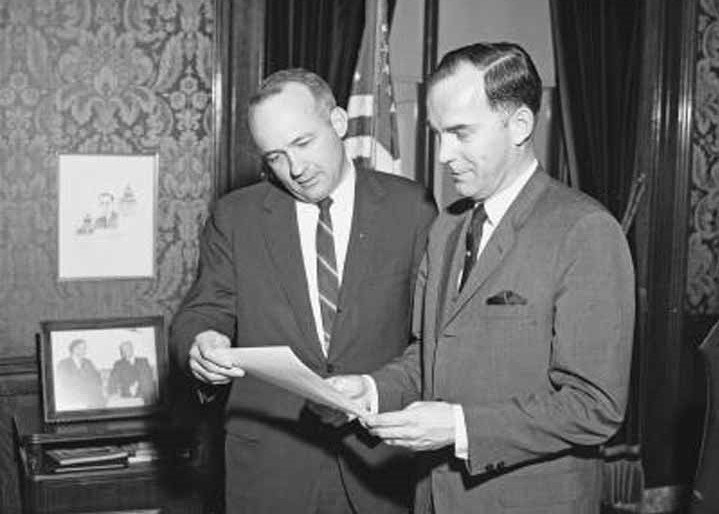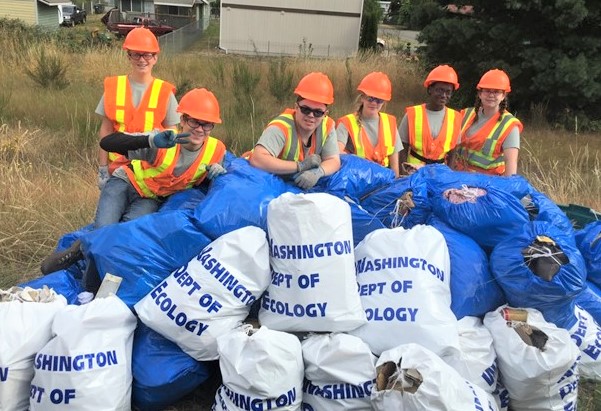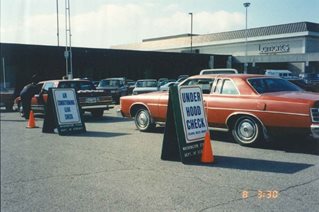History of Ecology
For more than 50 years, we’ve been a leader in environmental protection and restoration, both locally and nationally. As the first government environmental agency in the United States we became a model for partnering with communities, other government entities, tribes, and industry to benefit the environment.
Making history as the first environmental agency
Want to know more?
Check out our Blog to learn more about our current work across Washington:
> Southwest region
> Northwest region
> Central region
> Eastern region

On Feb. 12, 1970, the Washington Legislature voted to establish the Department of Ecology, and the agency was signed into law on Feb. 23, 1970, by Governor Dan Evans. Five months later, on July 1, 1970, Ecology officially opened its doors to 175 employees, becoming the first government environmental agency in the United States.
As an agency that predates the federal Environmental Protection Agency (EPA), we quickly became a model for environmental protection around the country. Many states looked to Ecology as a model for developing their own environmental protection agencies, including how partnering with communities, other government entities, tribes, and industry can benefit the environment.
During our first year, leaders at Ecology began working with state legislators to get a trio of important bills passed: the Model Litter Control Act, Shoreline Management Act, and State Environmental Policy Act. These bills not only laid the foundation for our work over the next 50 years but are still used today.
The early 1970s was also a key time for landmark federal legislation. In 1970 the federal Clean Air Act resulted in a major shift in the federal government's role by developing comprehensive federal and state regulations to limit air pollution. In 1972 the Clean Water Act established the basic structure for regulating the quality of water and what could be discharged into the waters of the United States. These federal acts continue to be a critical foundation to our state regulations.
We continued to grow and change. In those early years, Water Resources, the Water Pollution Control Commission, the Air Quality Control, and Solid Waste Sections from the Department of Health were consolidated into Ecology. Also, Ecology’s Youth Corps started in 1976. Our Youth Corps employs hundreds of crew members who continue to collect over 600 tons of litter and 93,000 pounds of recycled material each year from Washington's roadsides.
After the initial first growth our major programs stayed relatively the same until we added two additional programs to help reduce flooding, coordinate water use, and oversee large watersheds in Washington. The Office of Columbia river was founded in 2006 to meet current and future water needs along the Columbia River and its tributaries. In 2016 the Legislature established the Office of Chehalis basin, which administers funding and works closely with the Chehalis Basin Board to aggressively pursue implementation of the Chehalis Basin Strategy.
Ecology’s programs have accomplished many goals that have benefit the state. This includes Air Quality’s work, which resulted in 100 percent of communities meeting state/federal air quality standards, Shorelands & Environmental Assistance providing guidance and assistance from streams to ocean beaches, and the Spill Prevention, Preparedness, and Response program’s work leading to one of the lowest spill rates in the nation.
Protecting Washington’s environment
While we've developed many programs over the decades to protect the environment, one of our most well-known is the litter prevention program. It began in 1971 with an initial emphasis on educating children. The program evolved to include fictional characters to relate to kids, creation of the Ecology Youth Corps and various media campaigns, which led to a 66 percent decrease in litter between 1971-1976. Ecology’s ‘Litter and it will hurt’ media campaign in the early 2000s not only resulted in a 25 percent decrease in roadway litter, but gained national attention when our campaign against “trucker bombs” (bottles of urine drivers throw along roadways), led to a segment on The Daily Show with Jon Stewart. Learn more about our litter control history from our 50th anniversary litter blog. To learn more about our current campaign, visit our Keep WA Litter Free page.
Another well-known program is municipal stormwater permits. Rain and snow melt that runs off streets, highways, rooftops, and other surfaces is considered stormwater. Water flowing over these surfaces picks up pollutants that eventually make their way into the state’s water bodies. In order to manage this runoff, we created municipal stormwater permits to regulate discharges from municipal stormwater systems. These systems are owned or operated by cities, counties, and other public entities, and are separate from sanitary sewer systems. These systems keep pollutants out of waterbodies, and keep rivers, lakes, streams, and Puget Sound clean.


The vehicle emission check program started in 1982 to reduce the amount of air pollution in various communities. Transportation in Washington accounts for about 22 percent of total air pollution throughout the state. This pollution creates health problems and also contributes to climate change. Over the past several decades, our testing program, in addition to improvements in vehicle technology, has greatly improved air quality. The Legislature began to phase out the emission check program in 2005, and it officially ended on January 1, 2020. As vehicles continue to be more efficient and cleaner, air quality will continue to improve for future generations.
Investing in communities
Through our grants and loans, we invest directly in local governments, non-profit organizations, and tribal governments. Our finding helps communities: clean up former industrial pollution, restore natural functions of rivers and their floodplains, protect water quality, electrify school buses, restore habitat after an oil spill, and prevent and clean up litter.

The future of Ecology
Our 2019 - 2021 Strategic Plan outlines the challenges we're facing, and the steps we're taking to ensure that Washington’s environment is protected for generations to come. From responding to climate change, protecting air and water, reducing waste, protecting Puget Sound for orcas, and preventing and reducing toxic threats, we will continue to fight to protect and restore the environment.
During the 2021 session, the Legislature passed the HEAL (Healthy Environment for All) Act, which makes environmental justice an integral part of the way the state conducts business. The HEAL Act brings a greater focus and resources to over-burdened communities of color, economically disadvantaged communities, and indigenous communities. Focusing our time and resources to address these long-standing inequities will lead to more resilient communities, and improvements in health and the environment.
We remain committed to serving as Washington's environmental protection agency.



